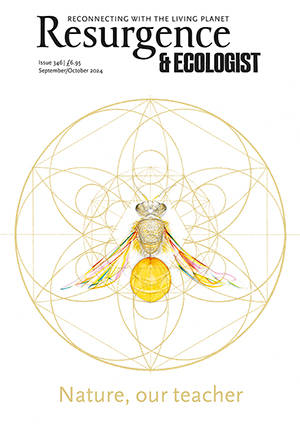A deliciously distillate yet elucidate vessel of climatological neuroepidemiology, The Weight of Nature takes a fresh approach to the ecological non-fiction book.
Not what you might expect from a book on environmental neuroscience – this story begins with the acknowledgement that the exhaustion of Earth and the depletion of the spirit are intrinsically linked and cripplingly liminal. “I’ve been feeling like I don’t fully exist,” begins Aldern, quoting water advocate Dezaraye Bagalayos, “like how I imagine the Earth to be feeling.”
A palimpsest of seven years of research, global travels and interviews, Aldern’s work gets down to the biological nitty-gritty of this ghostly feeling – investigating its relation to a rising climate. Whilst his work is based on the seemingly simple fact that the brain is built to model its environment, the implications of this model in a warming world are utterly staggering.
Aldern’s research on the cognitive impact of global heating can be split into several sections. The first suggests that temperature spikes drive surges in all behavioural ‘unpleasantries’, including aggravated assault, online hate speech and domestic violence. Aldern cites Anthony Heyes’ research, which is based on several thousand immigration court decisions over a 40-year period. He finds that for every 5.5C increase in temperature, the probability of a judge granting asylum falls by 7%. This can be put down to the fact that higher temperatures decrease functionality and connectivity between the brain’s regions involved in consecutive control, and cognitive performance suffers as a result.
These figures are disturbing, but they are just the tip of the neuroepidemiological iceberg. The book goes on to discuss our warming waters as an ideal host for various neurotoxins, such as the brain-eating amoeba Naegleria fowleri. These frightening microorganisms enter the body through the nose and travel towards the brain, where they feed on its cells. When conditions become unfavourable, N. fowleri can ‘shapeshift’ into indestructible cysts that remain dormant for up to 25 years. Sightings of the single-cell organism appear to be increasing alongside rising global temperatures. There is currently no cure, and exposure leads to almost certain death. While this might all sound like the plot of a dystopian sci-fi novel, this is the reality of our exhausted world.
Aldern goes so far as to investigate the impact of the climate crisis on those not yet born – foetuses in utero. In a study of a cohort of expectant mothers, Yoko Nomura discovered the impact of the 2012 Superstorm Sandy on unborn children. The researchers found that in utero exposure to the storm was associated with “increased risk for psychopathology” in children – with a 20-fold increase in anxiety in girls, and with boys up to 60 times more likely to be diagnosed with ADHD, compared to children born before or conceived after the storm. This implication gives a whole new meaning to the term ‘generational trauma’.
It’s clear that the cognitive symptoms of a warming world are bubbling to the surface in almost every sphere of our lives – from our ability to remember and empathise, to the prospects of our children. Despite this, Aldern’s research tells of a world where the communicative boundary between humans and the Earth is incredibly porous. We are being served a warning, but we are also being given a chance.
In understanding the ways and reasons that the Earth is reaching out towards us, we can come to implement this research in our policies and decision-making. Rather than trying to change the entire governmental system, this frame of analysis demonstrates the ways in which investment in conservation and regeneration offers a return. When money spent on alternative energies could decrease the prevalence of mental health conditions, or indeed levels of lethal bacteria in fresh water, the ‘return on investment’ of governmental conservation becomes significant.
While we are often so attuned to an individualistic separateness of self, The Weight of Nature offers a new way of understanding our relationship with the Earth through a grounded notion of planetary empathy. Through this framework, we can feel the Earth’s pain, recognise it for what it is, and attempt to heal one another’s scars. We can embrace the weight of Nature.
The Weight of Nature: How a Changing Climate Changes Our Minds, Brains and Bodies by Clayton Page Aldern. Allen Lane, 2024. ISBN: 9780241597378







